Here's a THREAD on the #USS Trustees, powerful individuals whose role has been insufficiently examined, and who have been operating without the full benefits of public scrutiny.
#USSstrikes #USSstrike #WeAreTheUniversity #StrikeForUSS #DemocratiseUSS #DemocratizeUSS
👇👇👇
#USSstrikes #USSstrike #WeAreTheUniversity #StrikeForUSS #DemocratiseUSS #DemocratizeUSS
👇👇👇
As the #USS dispute goes on, it's clearer than ever that the institutions that govern our pensions have been failing us in multiple ways. They are secretive, non-transparent, marked by conflicts of interest and revolving doors. We need to open up and #DemocratizeUSS.
Of the 5 “independent” Trustees of #USS, 4 have a background working for investment and financial services companies, the 5th used to work for Rio Tinto, the mining company, running their gold mines in Papua New Guinea.
Let's have a look at them.
👇👇👇
Let's have a look at them.
👇👇👇
(1) This "independent" #USS Trustee, Kevin Carter, has a background running investment funds. He worked for Old Mutual Asset Managers (UK) Ltd, before moving on to Watson Wyatt and then JP Morgan. 
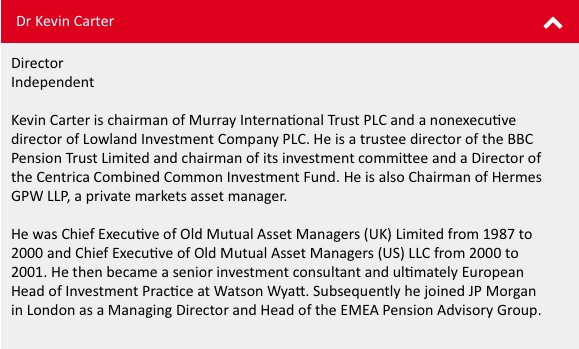
(2) This "independent" #USS Trustee, Kirsten English, works for Style Research, "a leading provider of portfolio analysis software and research". Before that she worked for Terra Firma Capital Partners. 
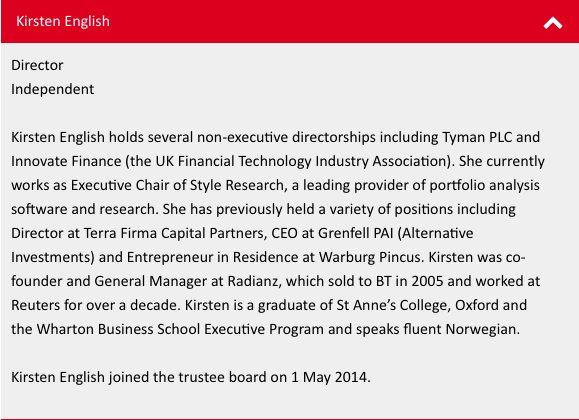
Before that, "independent" #USS Trustee Kirsten English was CEO at a company called Grenfell PAI Investments. This Bloomberg listing suggests that Grenfell PAI is domiciled in Guernsey. Perhaps they like the maritime climate there?
bloomberg.com/research/stock…
bloomberg.com/research/stock…
"Independent" #USS Trustee Kirsten English was, before that, co-founder of Radianz, which apparently is a company that "helps you to do business in the capital markets".
globalservices.bt.com/uk/en/products…
globalservices.bt.com/uk/en/products…
(3) The third "independent" #USS Trustee, Ian Maybury, works for Schroders, the Asset Management company, where he is head of "Solution Management" in its "multi-asset and portfolio solutions group". He was previously at Redlington and Citigroup.
professionalpensions.com/professional-p…
professionalpensions.com/professional-p…
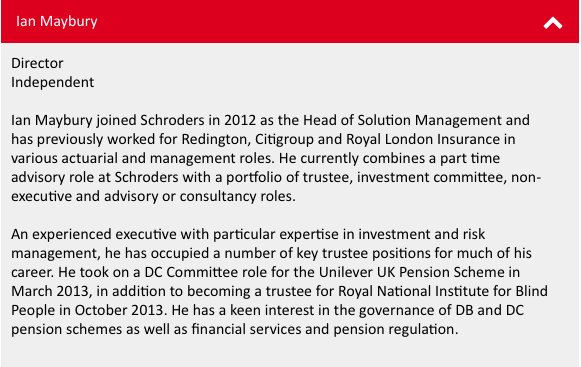
(4) The fourth "independent" USS Trustee is Rene Poisson, who worked for JP Morgan for 30 years, where presumably he was a colleague of "independent" USS Trustee Kevin Carter. 
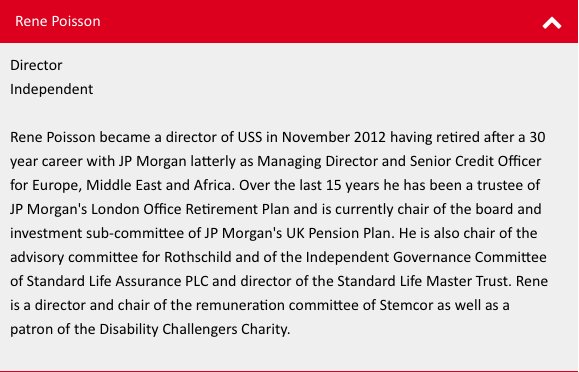
(5) The fifth "independent" USS Trustee is a bit different to the others, in not being a former banker or asset manager. Michael Merton worked for 30 years for Rio Tinto, the mining company. Michael Merton worked as CEO of Rio Tinto's gold mining subsidiary in Papua New Guinea. 
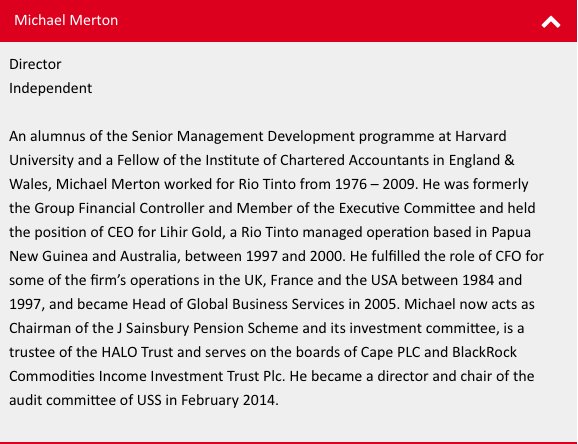
Rio Tinto is a company with a notorious record. Here are details of some of the abuses of human rights and labour rights that Rio Tinto have perpetrated:
"A Shameful History of Human and Labour Rights Abuses And Environmental Degradation Around the Globe"
londonminingnetwork.org/2010/04/rio-ti…
"A Shameful History of Human and Labour Rights Abuses And Environmental Degradation Around the Globe"
londonminingnetwork.org/2010/04/rio-ti…
And here is a piece in the @guardian detailing recent accusations that Rio Tinto have faced regarding environmental and human rights abuses.
theguardian.com/business/2013/…
theguardian.com/business/2013/…
So, to reiterate, "independent" #USS Trustee Michael Merton worked for 30 years for a company, Rio Tinto, that has been described as "a poster child for corporate malfeasance.”
corp-research.org/rio-tinto
corp-research.org/rio-tinto
In Norway, where the state pension fund has immesaurably better governance than we get from #USS in the UK, the decision has been made for the SPU to divest from Rio Tinto because of its appalling record of environmental damage and abuses.
theguardian.com/business/2008/…
theguardian.com/business/2008/…
This is what the Ethics Board of the Norwegian Statens pensjonsfond utland said about Mr Merton's longtime employer:
"Rio Tinto is directly involved, through its participation in the Grasberg mine in Indonesia, in the severe environmental damage caused by that mining operation."
"Rio Tinto is directly involved, through its participation in the Grasberg mine in Indonesia, in the severe environmental damage caused by that mining operation."
So, while the Ethics Board of the Norwegian State Pension Fund have divested from Rio Tinto because of its ethical and environmental abuses, #USS has instead decided to give a Rio Tinto insider, Michael Merton, a seat on its Trustee Board.
Should #USS members be happy with this?
Should #USS members be happy with this?
Does it matter that the Trustee Board of our #USS pension fund is packed with finance industry insiders, alongside a former Rio Tinto executive.
It matters a great deal. It shows the systemic rottenness of the governance of #USS & explains why we're in this mess.
It matters a great deal. It shows the systemic rottenness of the governance of #USS & explains why we're in this mess.
Turning our pension fund from a collective, solidaristic institution into an individualised DC system where atomised individuals bear the risk of their own financial investments, is obviously in the interests of the financial services industry.
The destruction of DB pensions and their replacement with a financialised system of individual savings opens up enormous new scope for finance industry middle-men to extract rents from our retirement savings.
See e.g. @ewanmcg here: blogs.lse.ac.uk/politicsandpol…
See e.g. @ewanmcg here: blogs.lse.ac.uk/politicsandpol…
On why the finance industry wants to destroy DB collective pension institutions see also:
@oeufling here "USS is the tip of the iceberg. Our pensions system is a hot mess":
opendemocracy.net/neweconomics/u…
@oeufling here "USS is the tip of the iceberg. Our pensions system is a hot mess":
opendemocracy.net/neweconomics/u…
And see also, for parallels to the destruction of DB pensions in the US, this piece by @DHWebber1 in the @nytimes:
"The Real Reason the Investor Class Hates Pensions"
nytimes.com/2018/03/05/opi…
"The Real Reason the Investor Class Hates Pensions"
nytimes.com/2018/03/05/opi…
As @dhwebber1 argues, the "Investor Class" hates collective pension funds like USS. Instead, finance insiders want to make money while small investors are silenced, isolated & marginalised
With #USS, the Investor Class have been put on the board. The fox is running the hen-house
With #USS, the Investor Class have been put on the board. The fox is running the hen-house
So *of course* these "independent" people are happy to see the end of USS as our collective institution, to be replaced with something that better suits their friends in the investment banks and in fund management.
That’s their world and how they think things should be. Finance insiders typically aren’t social democrats who believe in building shared institutions together. They’re the winners of neoliberalism and financial capitalism, who can’t see how twisted their perspective really is.
The question then is this: why the hell have we all been so asleep that we’ve allowed our futures to be in the hands of these people on the trustee board of #USS?
#DemocratiseUSS #DemocratizeUSS
#DemocratiseUSS #DemocratizeUSS
#USS is funded by *our* money, paid in every month of our working lives. It carries *our* hopes for dignity in retirement. Why have allowed these matters of overwhelming importance to be in the hands of this weird little clique of capitalist ultras?
Obviously the #USS Trustees need access to technical expertise, but they don’t all need to be people drawn from the worlds of banking and investment management. Where’s the cognitive diversity among these five? The diversity of sympathy, or identification, or imagination?
On the benefits of cognitive diversity for better decision-making, see the arguments of this book by Hélène Landemore @landemore:
press.princeton.edu/titles/9907.ht…
At #USS, with these "independent" Trustees, we've the opposite of cognitive diversity. We have disastrous insider groupthink.
press.princeton.edu/titles/9907.ht…
At #USS, with these "independent" Trustees, we've the opposite of cognitive diversity. We have disastrous insider groupthink.
As others such as @profmikefraser have pointed out, #USS itself has a complete lack of diversity in its higher management. Here are its "Principal Officers".
8 more-or-less interchangeable generic middle-aged white men. Are these the people we want running our pension fund?
8 more-or-less interchangeable generic middle-aged white men. Are these the people we want running our pension fund?

But back to our five "independent" #USS Trustees: Carter of JP Morgan, Poisson of JP Morgan, English of Radianz and Grenfell PAI, Maybury of Schroders, and Merton of Rio Tinto.
Given that these 5 "independent" #USS Trustees will in effect always have the casting votes between the UUK and UCU appointees on the USS board of Trustees, our future dignity in retirement is -- as things stand -- completely in their hands.
This is a grotesque scandal of appallingly inadequate governance. We need all of this to change completely.
#DemocratizeUSS #WeAreUSS
#ChangeIsComing #StrikeForUSS
#USSStrikes #USSStrike
#UCUStrikes #UCUStrike
#DemocratizeUSS #WeAreUSS
#ChangeIsComing #StrikeForUSS
#USSStrikes #USSStrike
#UCUStrikes #UCUStrike
unroll @threadreaderapp
• • •
Missing some Tweet in this thread? You can try to
force a refresh




